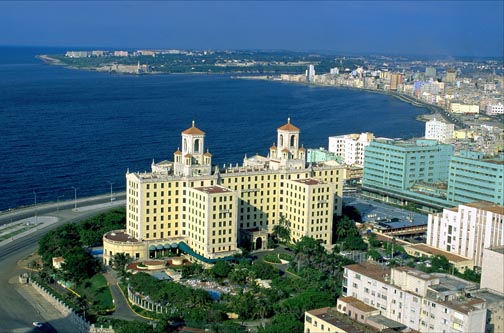Practical Techie: Tech in Cuba ‘ready to go supernova’


Author Rafael Matos is professor of multimedia at a private university and director of the Caribbean Multimedia Center, a nonprofit media lab focusing on closing the digital divide. Questions should be sent to [email protected].
No one knows when or how it will happen, but it when it does, U.S.-based companies that do tech commerce in the Caribbean will be ready.
Future informatics entrepreneurship in Cuba is floating over the horizon, just waiting for a legal green light. And Puerto Rico business people are most actively watching for the telltale signs of commercial rapprochement between the US government and the Cuban regime.
In fact, two decades after its first failed attempt to connect with the Cuban market, the Puerto Rico Manufacturers’ Association (PRMA) sent a delegation to Cuba this week to test out the waters and eyeball any upcoming opportunities. PRMA spokeswoman, Priscilla Vázquez told News is my Business, the trip is the first ever the trade group has sponsored to Cuba and that at least 40 entrepreneurs showed interest in the tour.
Puerto Ricans are subject to U.S. sanctions for illegal travel to Cuba, but the PRMA hired Phil Peters, a Washington consultant and Cuba expert who is putting together the trip and provides his people-to-people travel license. The firm Antilles Resources provided the logistics.
“PRMA’s exploration of the Cuban market is part of a state legislature-mandated effort to energize Puerto Rico’s manufacturing-based economy, which shrunk slightly in 2012 and is expected to stagnate this year,” said Vázquez.
Signs are that tech in Cuba might be “ready to go supernova,” according to an assessment by Idgconnect, an European information and technology firm. It is not a technophile heaven, but restrictions to Internet access are slowly cracking and easing. If you’ve got the money, you get access to all the few digital amenities available. The prospective chunk of future Internet users is colossal.
Also, thousands of young Cubans are graduating in computer engineering, a sector the government wants to firmly strengthen. Yet, their professional future is uncertain due to lack of Internet connectivity.
Since Cuba is a paradox, no one can explain at this moment why the government promotes so many digital engineers at the new University of Information Sciences and then gives them no chance to practice. Another irony is that in 2003, the country had 44 software production firms but since then, the Ministry of Informatics and Communications has reduced the number.
Cuba does seek outer resources. During the last 15 years it hosts an informatics fair in Havana for the exchange of ideas and knowledge with companies and researchers from other countries. Also, it seeks to boost business deals and cooperation. Some 1,400 experts attended the fair in 2012 from 30 countries, with China leading the fray.
Need for clear goals, priorities
Cuba has openly expressed a need to set clear development goals and priorities, attract investment, bolster competitiveness, quality and efficiency in order to increase service exports and attract foreign companies to manufacture components. The prevailing US embargo has also held Cuba back from joining the expanding hemispheric digital community. Two new undersea cables have been laid to bypass the blockade and are live, but of subpar service.
Meanwhile, the PRMA has been doing its homework. Just last March it sponsored an expert’s forum in San Juan, titled “Cuba, opportunities, today and tomorrow.” Twenty years ago, it did likewise, scheduling a series of workshops and seminars with Cuba experts, preparing and waiting to snap up any sudden opportunity for tech biz. It’s been a long wait.
But, not for naught. Just last year, Cuba created a large holding company that includes a dozen of the largest export and import entities on the island, establishing a separation of regulatory and managerial functions to improve the efficiency of state companies.
One of the entities that now reports to the new import and export consortium is technical assistance management firm Cubatécnica. It buys products and services for informatics and telecommunications, a field many high tech companies in Puerto Rico will have an eye on.
Cuba’s keen interest in digital development is not new. Personally, I did a reporting trip to Cuba in the 90’s and many Cuban officials were already talking in a corporate language about high tech development.
Not a digital clean slate
While its true that many experts think it is not ready to become a tech hub, the island is not a digital clean slate as are many backward countries in Africa, or even places like Iraq and Afghanistan.
Cuba does have the lowest mobile and Internet penetration rates in Latin America. While this is a bane for local Cubans, it’s a boon for entrepreneurs who can come in to help set up a modern infrastructure — on contract — presumably by whatever government is in power during the next fives years.
Private mobile phone service began only in 2008. Internet service for consumers is also a recent concession, estimated at a mere 14 percent of the population. The country only has a bandwidth of 323 megabits per second via satellite, which limits connectivity to Internet by institutions and government corporations.
Computer ownership is estimated at 3.3 per 100 people, a bonanza market for retailers given the chance to set up shop there. First of all, Cubans need, of course, to expand their acquisition power and that will be a long stretch. So, for the time being, opportunities lay in government contracting suppliers.
U.S. farmers already do multi-million dollar business with Cuba, on a humanitarian basis.
Island Cubans can easily access the national intranet, but have very little link to the global Internet. That might also be another future business opportunity. The government would, of course, have to lift its current restrictions to the .Cu servers.
Such tight controls have triggered a large underworld of pirated hardware and software, a digital ecosystem that could be substituted by a legal, well structured business venture. Also, the entire Internet technology in Cuba needs revamping of much of its outdated East European technology.
Tiny, homespun mobile phones repair shops are scattered all around Havana and other large cities, but it’s all artisanal and primitive. The scene is screaming for a chain of efficient, private cellphone providers and well-tooled service departments. Also, Cuba is a Wi-Fi limbo. Public data plans and hot spots are only in hotels and very expensive.
A savvy entrepreneur can take care of the void if Cuba were open to business.
Cuba has it own computer operating system called Nova, developed by the military and some university professors and is free to users. It’s a Microsoft clone of all sorts and badly inefficient. Without the embargo and with a free enterprise Cuba, the opportunities are unlimited in this field also.
The Cuban government does want and need a “supernova” version of its software for any future economic progress.
I won’t even mention the possibilities of streaming movies to those cinema-hungry Cubans.









